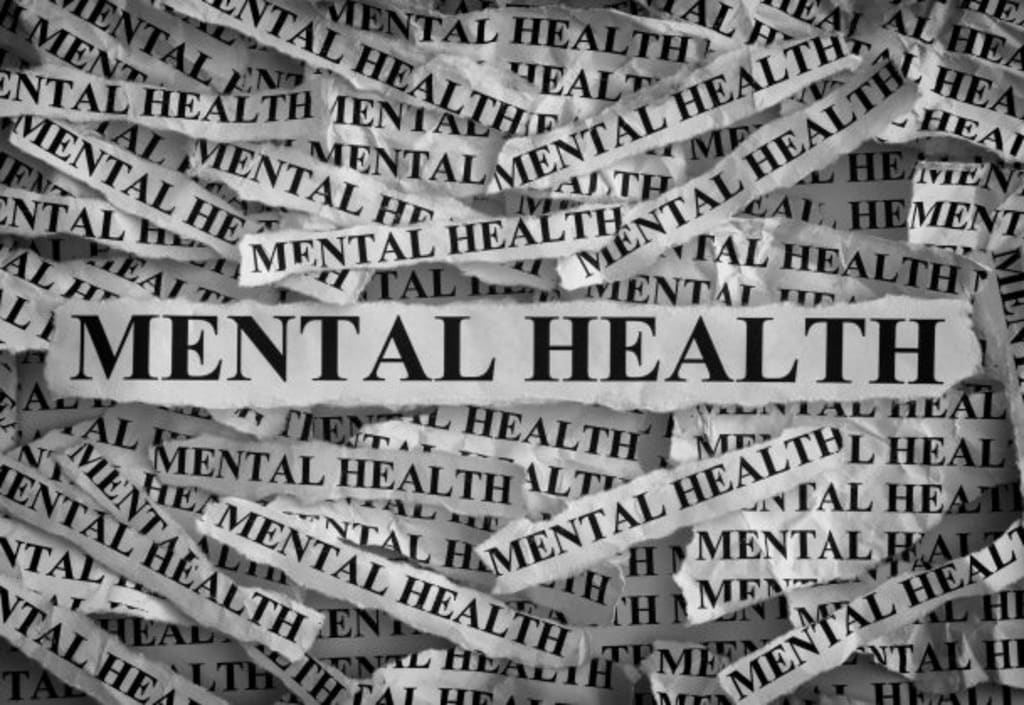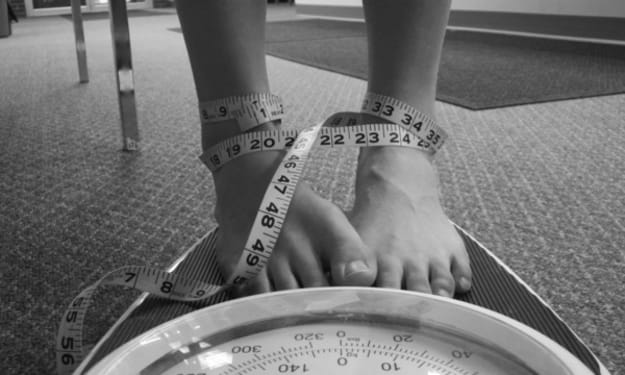Should Mental Illness Be Treated the Same as a Physical Illness?
A Persuasive Article About Living with Mental Illnesses in Today's World

The short answer: Yes.
Please allow me to persuade you to agree with me.
The Long Answer:
Mental illness affects an astounding (and increasing) number of people across North America. 1 in 5 people in any given year in Canada will experience a mental health or addiction problem. By the time Canadians reach 40 years of age, ONE HALF have or have had a mental illness (1) . These numbers are absolutely insane and cannot go ignored. Lately I have noticed employers and family friends treating individuals with mental disorders improperly, and I have a goal to fix that habit. I'm going to prove the above statement by first allowing you all to see just how horrible living with a mental disorder really is - and then justify why it should be treated just as if the individual had a physical ailment.
The definition of a mental illness or psychosis is defined by the DSM - IV (Diagnositic Statistic Manual) which is how psychiatrists and Doctors diagnose patients with mental health issues. Word for word, it is defined as:
"[...] a syndrome characterized by clinically significant disturbance in an individual's cognition, emotion regulation, or behavior that reflects a dysfunction in the psychological, biological, or developmental processes underlying mental functioning. Mental disorders are usually associated with significant distress in social, occupational, or other important activities. An expectable or culturally approved response to a common stressor or loss, such as the death of a loved one, is not a mental disorder. Socially deviant behavior (e.g., political, religious, or sexual) and conflicts that are primarily between the individual and society are not mental disorders unless the deviance or conflict results from a dysfunction in the individual, as described above.” (2)
"Mental illnesses exist just as cats and bumblebees exist." That statement cannot be argued. These terrible diseases and illnesses worm their way into the lives of innocent people through genetics, biological factors, and environmental factors to affect MILLIONS of people and their families and caregivers.
They destroy and change lives. They cause people to act in ways that are so unlike themselves normally. They rewire their brain without consent. These people are living through their disease. This is why I believe that mental illness should be treated the same as a physical illness — they are both debilitating, they both have prevalence in the mind and actions, and they cause an undesirable amount of stress on every person effected.
Like a physical illness, a mental illness is stressful, causes changes in mood and nutrition, can be so disabling to those affected that all they want is for you to really see them for how they are. These illnesses mean something different to every person, and every person perceives them and acts through them in their own specific way. What I wish for the world is to rely on the help of doctors and psychiatrists to properly diagnose people before they go around claiming to have a mental illness that may or may not be correct — people around them do have it, and it really does affect their daily life and the lives around them.
Let’s look at some characteristics of having, say…a broken arm versus having Dysthymia (chronic depression), just for an example.
- Duration: Broken arm lasts approximately 6 weeks. Dysthymia can last a lifetime, with a depressive episode lasting up to 3 weeks.
- Symptoms: Broken arm has pain, swelling, a cast, treatment, physiotherapy possibly, pain when a specific part of the arm is pressed, stiffness when in a cast, disabled writing, typing or driving. Dysthymia has numbness, loss of interest in normally excitable things, inability to complete tasks or get out of bed, may need psychotherapy, sadness or depressed mood, major change in weight, feelings of hopelessness or worthlessness, excessive guilt felt almost every day, problems concentrating, insomnia and being physically restless.
- Treatment: Broken arm needs time to heal, possibly physiotherapy to help with movement, and pain medication. Dysthymia needs psychotherapy, medication and a positive environment to help with rehabilitation.
Let’s just think about this for a second — is anyone willing to actually tell me that a mental disorder such as Dysthymia is NOT as debilitating as a broken arm?? Considering both need a terribly high amount of concern and treatment, I’m not sure what people are going on about. The answer is absolutely clear.
Physical illnesses or ailments and mental illnesses or ailments should be treated EQUALLY. Please for the love of all that is holy, show this to your employers, your teachers and your family members. Have your discussion with them, and let's change this about the world.
My short backstory:Growing up with diagnosed depression and general anxiety disorder, my only wish (other than to not have it in the first place) was to have it taken seriously by my peers, counselors, teachers and employers. For them to really understand and be educated on what I have to deal with every day, be sympathetic to that, and not “expect” my behavior to be a certain way. Growing up with chronic depression isn’t easy in a household that won’t let you take a day off because you ‘can’t get up.’ Yes, I couldn’t get up, but being forced out of bed doesn’t exactly give my day a good start, either. I remember classmates asking me through high school what was wrong with me since I looked so distant and void of emotion some days, or asking me why I had to race out of a class to go to the bathroom instead of being normal and putting my hand up to ask. I was void of emotion because I’m mentally sick, and I had to race out of the room because I had convinced myself that I would fail a class and I needed to be by myself for the incoming panic attack — just for example. I led some mental health groups at my school as well — I figured I may as well do my best to help other people who are suffering like I am and maybe make something of it. The stories these kids had were absolutely incredulously horrible. Abuse, addiction, you name it — kids in high school really do know what’s going on around them. We banded together to support each other when no one else would take our mental health seriously. And it worked.Coming into adulthood now, I have a final diagnosis now of Bipolar II disorder. People now seem to be much more sympathetic since I have an ‘actual problem.’ I find it sad that when you tell someone you have depression or anxiety, they just brush it off as if it’s nothing and that you’ll be fine tomorrow, but the second you say that you have bipolar, people are SUPER concerned about you because they know something is ACTUALLY wrong. And how terrible is that — people take depression and anxiety disorders so lightly now because people are wide-spreading that they ‘have it’ when people are literally suffering and almost dying (like myself) over these diseases. Bipolar disorder, as many other mental health issues, is nothing to laugh over — it’s a horrible disease that makes you feel different every day. It’s an illness for a reason — one week I can’t get out of bed and the next week I’m so manic that I want to jump off a cliff. What a way to live.Author's note: I hope at least one person finds solace in this article — to know that you're not alone in a world that can sometimes be so cruel. You're loved, you're important, and you're worth rehabilitation.
About the Creator
Lorah Catherine
Tweet me PLEASE: @LCwritesthings
I don't like writing about the same thing everyday.
I don't like reading about the same topics everyday.
Stay tuned for some 'different' perspectives on my strange worldview.






Comments
There are no comments for this story
Be the first to respond and start the conversation.